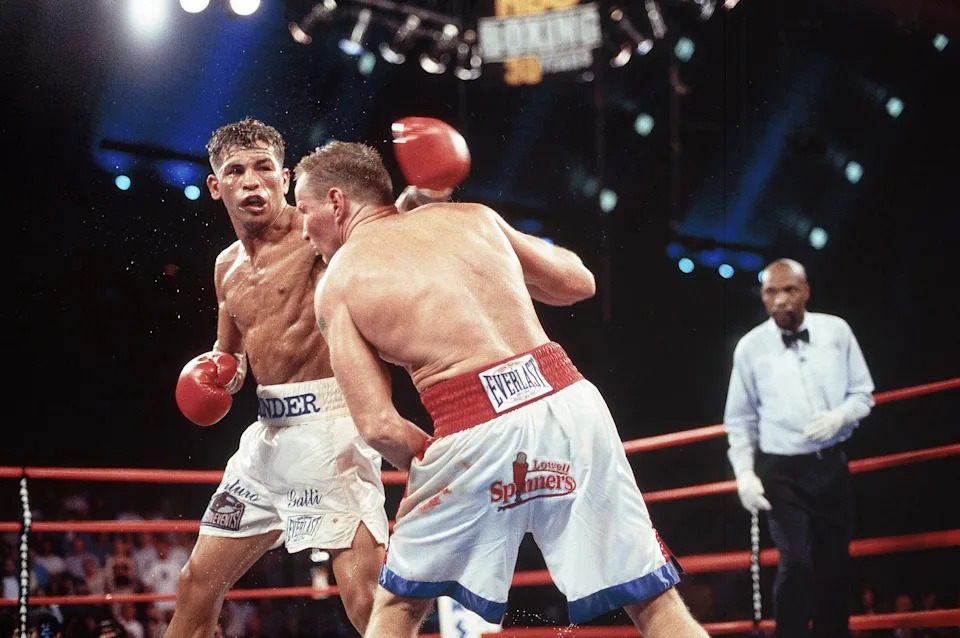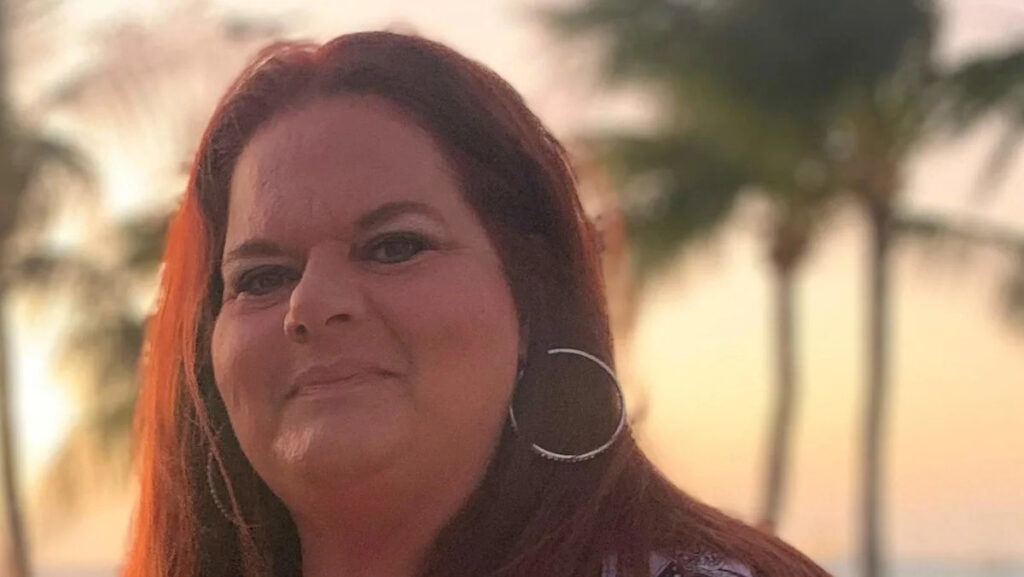The phones rang at the Main Events promotional offices in the late 1990s, and Jolene Mizzone sat at the front desk taking calls and typing letters.
“I didn’t care about boxing,” the one-time receptionist tells Uncrowned. Her knowledge of the sport was limited to “the big ones.” This meant Evander Holyfield. It meant Mike Tyson.
Advertisement
“I just needed a job,” she says.
Boxing has a way of pulling people in, though, and soon it pulled her in too.
Mizzone eventually moved into fighter relations and logistics — booking travel, arranging hotels and managing transportation. She set up chairs at shows, arranged fighter medicals, and even drove athletes back and forth from the airport. At events, boxers leaned over and told her what to look out for: A right hand here, a wrong step there. Her education was in and around the ring as much as it was an office.
“Getting to know these guys outside of the ring is really what caught my attention,” she says.
Advertisement
That was the hook. Mizzone wasn’t just running schedules. She wanted to help these young athletes realize their wildest dreams. “I knew I would just love to see these young guys that I started working with, go up the ladder and become world champions,” she says.
Evander Holyfield fought in some of boxing’s biggest bouts of the 1990s.
(Focus On Sport via Getty Images)
Behind the scenes, Kathy Duva — who ran longtime boxing promotional entity Main Events after her husband Dan’s passing in 1996 — entrusted Mizzone with more, eventually telling her to book fights, and not just travel. “I wouldn’t be where I am today without Kathy,” Mizzone says of her mentor.
Another guiding voice was Hall of Fame matchmaker Russell Peltz, who urged her to trust her gut — advice that would guide her to the top.
Advertisement
Mizzone earned her way up the same way the fighters did — the hard way. From receptionist to confidante, and from confidante to matchmaker. Until, perhaps inevitably, the boss.
“I feel that I’ve earned the title,” says Mizzone, now the president of surging agency Fighters First Management and an inductee into the Atlantic City Boxing Hall of Fame later this month.
Her rise mirrors boxing itself.
Boxers start in obscurity, learning from coaches until they prove themselves when their name is called.
Mizzone did the same. She entered as an outsider, but stayed, fought for her place, and became a trusted voice to icons like Arturo Gatti and Evander Holyfield.
Advertisement
On fight nights in Atlantic City, the raucous, smoky and electric Boardwalk Hall shook like few arenas in the sport at that time.
When Gatti walked to the ring, there were few things like it as an expectant crowd braced for blood. His fights weren’t just events — they were guarantees that war was about to ensue.
His loss to Ivan Robinson in 1998, and two of the three-fight series with Micky Ward, all won Fight of the Year at Boardwalk Hall — a venue Gatti helped keep alive as one of Main Events’ most bankable stars in the post–Holyfield era. Live crowds in the arena, together with HBO audiences at home, were glued to him. He reliably lived up to his nickname, “Thunder,” fighting through pain to gain worldwide acclaim. His gritty style — part boxer, mostly brawler — made Atlantic City feel like sacred ground for fight fans.
Advertisement
Now enshrined in the Hall of Fame, the late Gatti remains revered around the fight world. And Mizzone saw it all up close.
During one particular fight week in Atlantic City, officials checked Gatti’s weight. He was drained and irritable, focused only on the scale. “He didn’t say anything to me,” Mizzone remembers, noting from experience with Fernando Vargas that fighters often kept to themselves when cutting weight.
Gatti was no different. He, too, made weight and left without saying a word to anybody.
But, five minutes later, Mizzone’s phone rang.
“Hello?” she answered. It was Arturo.
“I’m sorry I didn’t say hi,” he said. “I was just really cranky.”
Advertisement
Mizzone didn’t know what to say. “Who does that?” she thought. Most fighters don’t circle back after a miserable cut. Gatti did. He wanted her to know she mattered.
For Mizzone, it was proof that fighters let their guard down around her. She was trusted.

Arturo Gatti (L) and Micky Ward lit up Atlantic City’s Boardwalk Hall back in 2003.
(John Iacono via Getty Images)
And Gatti wasn’t the only one. Stories like that piled up over the years.
Lennox Lewis was the easiest Mizzone worked with, she says. He wanted a ping pong table in his suite, and when someone on his own team swapped it for a pool table without him knowing, he walked in and deadpanned: “So much for ping-pong.”
And then there was Holyfield — one of “the big ones” Mizzone only knew by name when she first took the receptionist job, but who became part of her day-to-day reality once she was on the inside. Considering where she started, being around him was a reminder of how far she’d come.
Advertisement
To Mizzone, these moments revealed who fighters really were: Not just elite athletes capable of winning championship belts under the brightest of lights, but human beings with quirks, tempers and soft edges. Seeing them at their rawest shaped how she dealt with boxers, and why she came to believe that the hardest lessons come through adversity.
Having worked in the sport for close to 30 years, Mizzone is now a bridge between eras, from yesteryear’s Hall of Famers to today’s fast-rising sluggers.
“A lot of fighters today seem more pampered,” she says.
“I don’t care if you were Marvin Hagler or Sugar Ray Leonard … you had adversity back then. And you need that now because it only makes you that much stronger.”
Advertisement
That’s part of why she speaks so fondly of the sport’s latest menace, Brian Norman Jr., who is her WBO welterweight world champion.
Norman is a “throwback,” according to Mizzone, and he’s come up the hard way.
WBO welterweight champion Brian Norman Jr. is one of the top young stars in American boxing.
(Steve Marcus via Getty Images)
Overlooked during the reigns of Terence Crawford and Errol Spence Jr., Norman fought in Jaron “Boots” Ennis’ shadow until he announced himself with a nasty knockout of Jin Sasaki in Japan earlier this year.
Just hours after his signature win, Norman, those close to him, and the Fighters First Management team, celebrated victory at their hotel.
Mizzone saw Norman reach for his credit card.
“Brian!” Mizzone said. “You just won a big fight. We’ve got this.”
Advertisement
But Norman “really wanted to pay,” Mizzone marvels. “No fighter has ever been like that.”
Mizzone and Fighters First expect Norman’s star in boxing to continue to shine even when the Top Rank stud takes on his toughest test yet, a defense of his WBO welterweight world title on Nov. 22. He fights Devin Haney in an all-American battle at the ANB Arena in Riyadh, atop a DAZN card featuring fighters from across the promotional aisles, including Sampson Boxing, PBC and Queensberry.
Beyond the ropes, Norman is like a modern-day Mike Tyson with an appreciation and encyclopedic knowledge of the sport’s history, and an understanding of his place within its present.
“The first fight we had with him,” Mizzone says, “I took him to the Hall of Fame.”
Advertisement
She told him he could get whatever he wanted and she would foot the bill. “He comes back to me with books.”
Mizzone continues: “He learns and teaches himself. Not only boxing, but he reads everything.”
Norman’s personality meshes with Mizzone’s own philosophy. The very first thing she asks fighters when meeting them is: “What do you want out of boxing?”
Their answer determines whether they’ll be a fit. If you want to be famous, or a millionaire, the chances are Mizzone is not the manager for you. “They’re not for boxing,” she snaps.
“If you believe in yourself, you’ll become a champion, and the money will come. But if you’re looking at the money first, you won’t ever believe in yourself.”
Advertisement
Mizzone has long believed in herself. Her creed is summed up in the advice she’d give other women forging careers in a male-dominated sport.
“Don’t ever use that, ‘I’m a woman and I don’t get respect’ … You should be a boss. Bosses come in all shapes, sizes, genders. Just be who you are.”
“Tell me one job in this world besides maybe a hairdresser that isn’t male-dominated,” she finishes.
“You can’t cry it out or complain. Just be a boss.”
Read the full article here


